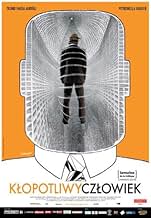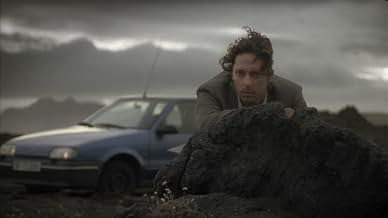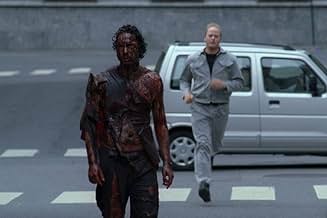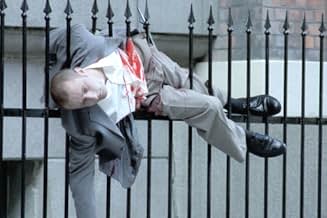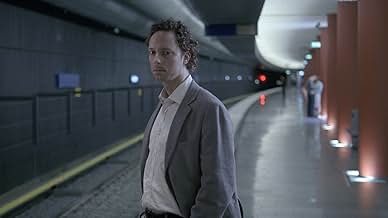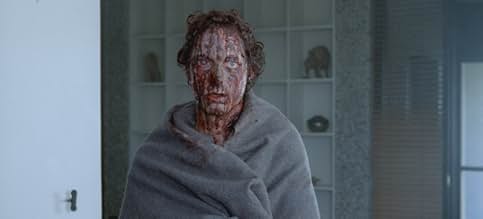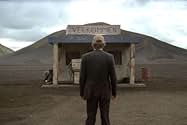ÉVALUATION IMDb
7,2/10
18 k
MA NOTE
Ajouter une intrigue dans votre langueIn a strange city where every person seems content beyond reason a new man arrives in town and stirs up trouble by asking too many questions.In a strange city where every person seems content beyond reason a new man arrives in town and stirs up trouble by asking too many questions.In a strange city where every person seems content beyond reason a new man arrives in town and stirs up trouble by asking too many questions.
- Prix
- 26 victoires et 9 nominations au total
Trond Fausa
- Andreas
- (as Trond Fausa Aurvåg)
Aldun G. Magnaes
- Gutt som kliner
- (as Audun G. Magnæs)
Mette K. Haugen
- Jente som kliner
- (as Mette Karin Haugen)
Gard Petersen
- Forvalter 1
- (as Gard Pedersen)
Benny Glaerum
- Forvalter 2
- (as Benny Glærum)
Histoire
Le saviez-vous
- AnecdotesThe car used to pick up Andreas at the gas station is a Panhard 24, a French car not made since 1968.
- ConnexionsReferences Paris, Texas (1984)
Commentaire en vedette
First of all, forget all the Christian stuff (heaven, hell, purgatory). You are in Norway.
The director intended well to show it is shot in Oslo, it is easy to recognize the places. It is a sharp look at the values that rules the country and at the lack of sentiments and feeling of the Norwegian society.
Note that Andreas - does he arrive to Oslo by his own will - does not really has a job, but a place in the society that give him access to "happyness": - an apartment - a convertible - friends from the work place - a girl, who has only interest for kitchens - another girl who cannot say I want but only I may The girls are cruelly described, but again the 1st one is the typical Norwegian "witch" (sorry to use this word, I translate literally from Norwegian) and the second the everyone's girl friend; both are typical characters of the Norwegian society.
Andreas has other values, is sensitive and want to make choices: warm chocolate and children.
It is deep buried in the cellars of the old buildings of Oslo housing old people; the room at the end of the tunnel is a typical grandma Norwegian kitchen.
The soundtrack is Peer Gynt, almost the Norwegian national anthem, adding again to that lost paradise's nostalgia.
The final scene is shot at the house of common of Oslo and the people coming out of the building are meant to be the deputies or minister of the country and they tell Andreas that they did everything to make him happy, if I remember correctly, just before expelling him.
Although Andreas injures himself to show his feelings,the gore scenes may seem strange here but maybe the director use it to mock the conformity of the Norwegian cinema, as it has been mandatory for the last decade to show very violent scenes in almost every movie.
Is the bus also a typical character of the Norwegian society? I wonder because for celebrating the end of the studies , the Norwegian students have "party buses" this ritual marks the entering into the adult life, and Andreas coming from nowhere in a bus to this town. what do you think?
The director intended well to show it is shot in Oslo, it is easy to recognize the places. It is a sharp look at the values that rules the country and at the lack of sentiments and feeling of the Norwegian society.
Note that Andreas - does he arrive to Oslo by his own will - does not really has a job, but a place in the society that give him access to "happyness": - an apartment - a convertible - friends from the work place - a girl, who has only interest for kitchens - another girl who cannot say I want but only I may The girls are cruelly described, but again the 1st one is the typical Norwegian "witch" (sorry to use this word, I translate literally from Norwegian) and the second the everyone's girl friend; both are typical characters of the Norwegian society.
Andreas has other values, is sensitive and want to make choices: warm chocolate and children.
It is deep buried in the cellars of the old buildings of Oslo housing old people; the room at the end of the tunnel is a typical grandma Norwegian kitchen.
The soundtrack is Peer Gynt, almost the Norwegian national anthem, adding again to that lost paradise's nostalgia.
The final scene is shot at the house of common of Oslo and the people coming out of the building are meant to be the deputies or minister of the country and they tell Andreas that they did everything to make him happy, if I remember correctly, just before expelling him.
Although Andreas injures himself to show his feelings,the gore scenes may seem strange here but maybe the director use it to mock the conformity of the Norwegian cinema, as it has been mandatory for the last decade to show very violent scenes in almost every movie.
Is the bus also a typical character of the Norwegian society? I wonder because for celebrating the end of the studies , the Norwegian students have "party buses" this ritual marks the entering into the adult life, and Andreas coming from nowhere in a bus to this town. what do you think?
- strandedinoslo
- 18 juin 2010
- Lien permanent
Meilleurs choix
Connectez-vous pour évaluer et surveiller les recommandations personnalisées
- How long is The Bothersome Man?Propulsé par Alexa
Détails
- Date de sortie
- Pays d’origine
- Site officiel
- Langue
- Aussi connu sous le nom de
- The Bothersome Man
- Lieux de tournage
- sociétés de production
- Consultez plus de crédits d'entreprise sur IMDbPro
Box-office
- Budget
- 14 000 000 NOK (estimation)
- Brut – à l'échelle mondiale
- 379 331 $ US
- Durée1 heure 35 minutes
- Couleur
- Mixage
- Rapport de forme
- 1.85 : 1
Contribuer à cette page
Suggérer une modification ou ajouter du contenu manquant

Lacune principale
By what name was Den brysomme mannen (2006) officially released in India in English?
Répondre

